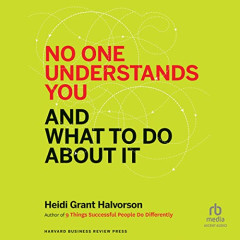Ditapis dengan
E-book Lost in Digital Translations : Studies of Digital Resistance and Accom…
Our aim in this chapter is to show and discuss what is lost in digital trans-lations as the welfare state and society increasingly use digital technology in welfare production. We argue that there are several unintended conse-quences we need to be attentive to regarding digitalising society and our welfare production, distribution, and consumption. In addition, there is a need to make what is l…
- Edisi
- -
- ISBN/ISSN
- 9788202781033
- Deskripsi Fisik
- 205 hlm
- Judul Seri
- -
- No. Panggil
- 362 ALE l

E-book No One Understands You and What to Do About It
Have you ever felt you're not getting through to the person you're talking to, or not coming across the way you intend? You're not alone. Most of us assume that other people see us as we see ourselves, and that they see us as we truly are. But neither is true. Our everyday interactions are colored by subtle biases that distort how others see us--and also shape our perceptions of them. You…
- Edisi
- -
- ISBN/ISSN
- 9781625274120
- Deskripsi Fisik
- 149 halaman
- Judul Seri
- -
- No. Panggil
- 300.72 HAL n
E-book Encyclopedia of Communication Theory
Sociolinguistic research in the 1950s and 1960s had shown how people change the degree of formality of their language as a function of the social contexts in which they find themselves. This was explained in terms of social norms dictating language use. In other words, we should speak very softly and respectfully here, but we can be more boisterous and casual there. Communication (or speech) ac…
- Edisi
- -
- ISBN/ISSN
- 9781412959377
- Deskripsi Fisik
- 1174 hlm
- Judul Seri
- -
- No. Panggil
- 380.03 LIT e
 Karya Umum
Karya Umum  Filsafat
Filsafat  Agama
Agama  Ilmu-ilmu Sosial
Ilmu-ilmu Sosial  Bahasa
Bahasa  Ilmu-ilmu Murni
Ilmu-ilmu Murni  Ilmu-ilmu Terapan
Ilmu-ilmu Terapan  Kesenian, Hiburan, dan Olahraga
Kesenian, Hiburan, dan Olahraga  Kesusastraan
Kesusastraan  Geografi dan Sejarah
Geografi dan Sejarah